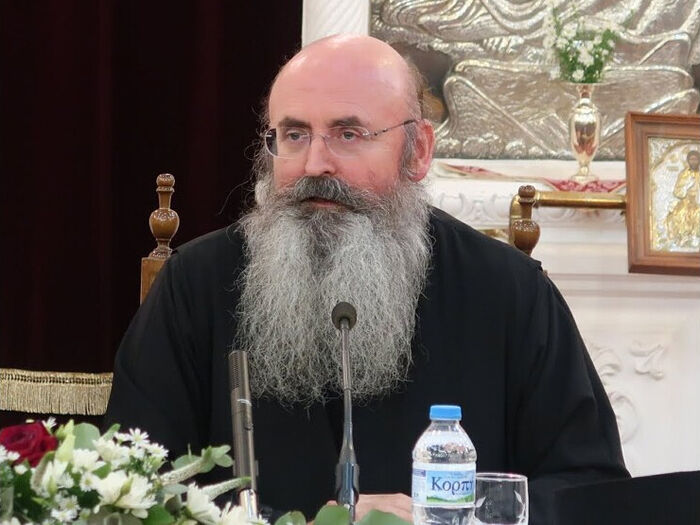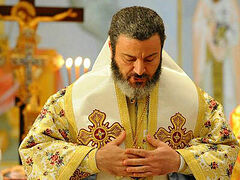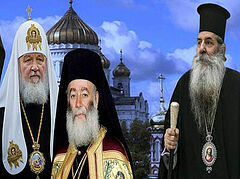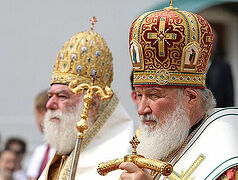 Metropolitan Gregorios of Peristeri
Metropolitan Gregorios of Peristeri
Metropolitan Gregorios of Peristeri recently came out with a curious initiative: to deprive the Russian Orthodox Church of autocephaly for five years as punishment for receiving into its own jurisdiction clergy and laity of the Alexandria Patriarchate who considered it unacceptable to remain in the jurisdiction of a hierarchy that has entered into eucharistic communion with obvious schismatics—Dumenko and his adepts, and the following establishment of an exarchate on the territory of Africa. In other words, Metropolitan Gregorios (Papatomas), a canonist famous for his very original concepts, whom no one had taken seriously before, is accusing the Russian Church of invading the canonical territory of the Alexandria Patriarchate.
Meanwhile, the jurisdiction of the Alexandrian throne originally spread over Egypt, Libya, and Pentapolis, now a part of the Libyan nation destroyed by aggressors: “The ancient customs of Egypt, Libya and Pentapolis shall be maintained, according to which the bishop of Alexandria has authority over all these places since a similar custom exists with reference to the bishop of Rome. Similarly in Antioch and the other provinces the prerogatives of the churches are to be preserved…” (Canon 6, First Ecumenical Council1), but not over Africa. During the era of the Ecumenical Councils, Africa was called a diocese with its center in Carthage, which was approximately the territory of modern Tunisia and the eastern part of Algeria. The beginning of the Alexandrian Church’s real presence in countries outside of Egypt can be traced back to the 1920s. The Alexandrian Patriarchate’s spread of jurisdiction over the entire continent was not challenged by a single Local Orthodox Church, including the Russian Church.
But the situation radically changed in 2020, after the Patriarch of Alexandria entered into Eucharistic communion with Ukrainian schismatics. Canonically conscious clergymen and laypeople could no longer remain under the jurisdiction of a schismatic hierarchy. Naturally they sought out a legitimate solution to the crisis that had arisen, and found it in turning to the hierarchy of the Russian Church with a request to be received into communion with them. There can be no other solution other than receiving into canonical communion and care those who have realized the peril of schism into which the schismatics have drawn them. After the Orthodox Primate of Alexandria fell away from Orthodoxy, canonically the African continent has become a diaspora for the Orthodox Church. The question of restoring the Alexandrian Patriarchate’s canonical monopoly in Africa can be discussed only after the schism has been overcome, and the Orthodox hierarchs that have fallen away can be received through repentance into communion with canonical hierarchs.
And so, after the Moscow Patriarchate took its canonically legitimate step, an apologist for Dumenko put forth the exotic idea of putting the Russian Church to trial. Metropolitan Gregorios (Papatomas) proposes that a Council of the Pentarchy conduct this trial, regardless of the fact that the canons do not provide for any such institutions or procedures. As we know, the peculiar teaching of a “Pentarchy”, that is, that there can only be five Patriarchs in the Church, just as there are only five senses, and that the entire Oecumenia should be divided between them, took shape in the nineteenth century. The teaching of the “Pentarchy”, deprived of any canonical or historical basis, gave the ethnophyletists from the Constantinople Patriarchate false reasons for retaining ecclesiastical hegemony over non-Greek Orthodox Churches. Meanwhile, the Third Ecumenical Council had already affirmed in its eighth canon the autocephaly of the Church of Cyprus, which Antiochus had disputed, and left no reasonable ecclesiastical basis for the development of any teaching concerning the exclusive superiority of the five first Thrones over the Christian world. Besides the autocephaly of the Church of Cyprus headed by an archbishop, from the time of the holy Emperor Justianian there also existed the autocephalous Church of New Justiniana, headed by an archbishop, and the autocephaly of the archbishopric of Ochrid is linked to it by succession. In the historical sense, the teaching of the Pentarchy lost any grounds it might have had for existence after the Roman cathedra, which still hold first place in the dyptichs, fell away from the Ecumenical Orthodox Church. The Roman Church had moreover rejected this teaching earlier by ascribing universal jurisdiction to itself—which of course is the main reason for the schism of 1054.
Over a thousand years have passed since then, and now, in our own time, in 2011, with Patriarch Bartholomew’s blithe initiative the idea of a “neopentarchy” was once again brought up, the membership of which was to be constructed as follows: four ancient Patriarchs and the Church of Cyprus. And now Metropolitan Gregorios (Papatomas) proposes that this institution, which exists only in the imagination and words of certain ecclesiastical personages, take on the role of judicial authority in Christ’s Church—in place of an ecumenical council; for the neopentarchy to pronounce judgment against the autocephalous Russian Orthodox Church in corpore and affirm at this trial the project that he [Met. Gregorios] has already personally devised—a sentence in the form of depriving the Moscow Patriarchate of autocephaly for five years. There are no known precedents for such judicial processes; ecclesiastical courts have never subjected to any such process any Local Churches, or dioceses, or parishes, or monasteries, but only laypeople and clergymen personally who were accused of causing a schism, falling into heresy, or other ecclesiastical crimes. The supreme judicial authority in every autocephalous Church is carried out absolutely independently, with decisions that are final and not subject to any review other than of an Ecumenical Council. The accusations brought by the Metropolitan of Peristeri against the Russian Orthodox Church are essentially unfounded, because as we said earlier, no one is obligated to remain in the jurisdiction of a bishop who has gone into schism, and the acceptance into canonical communion of clergy and laity who have left hierarchs who have gone into schism is not just a right, but an act of fulfilling ecclesiastical duty. The canonical boundaries of the Local Churches remain applicable only to those Churches that remain in the bosom of the one Holy Catholic and Apostolic Church, and not to schismatics or heretical denominations.
Thus, the Peristeri Metropolitan’s idea is a conglomeration of absurdities and obviously not realistic, but because there are no grounds for suspicion that its author has lost his mind or memory, it of course was not calculated to bring its presupposed result. This is a provocation, most likely aimed at deepening the crisis in the mutual relations between the Local Orthodox Churches—in other words, to undermine Orthodoxy.
In this case, we are hardly dealing with a personal initiative, but most likely the fulfilling of an order from some other entity. At one time it was officially announced that after the victory over communism as a result of the Cold War, the Orthodox Church should be viewed as the main enemy of the “free world”.
In Metropolitan Gregorios’s original article there is a significant historical mistake—which, by the way, many other authors also make—about the Russian Orthodox Church having receiving its autocephaly from the Constantinople Patriarchate. That event never took place. The Russian Church did not receive autocephaly—it was forced to break communion with the kyriarchal Constantinople Patriarchate, which had apostatized from Orthodoxy at the odious Council of Florence, and the Russian Church thus obtained autocephaly without needing any tomoses from a schismatic or blatantly heretical hierarchy. And it happened not in 1589 but in 1448. In 1589, the Gramota of the Institution of Patriarchy in Moscow was published, signed by the hierarchs and Primate of the Constantinople Patriarchate, which had by that time returned from the Unia to the bosom of the Holy Catholic and Apostolic Church, where the Russian Church unfailingly has remained throughout its entire history from the time of the Baptism of Rus’.




